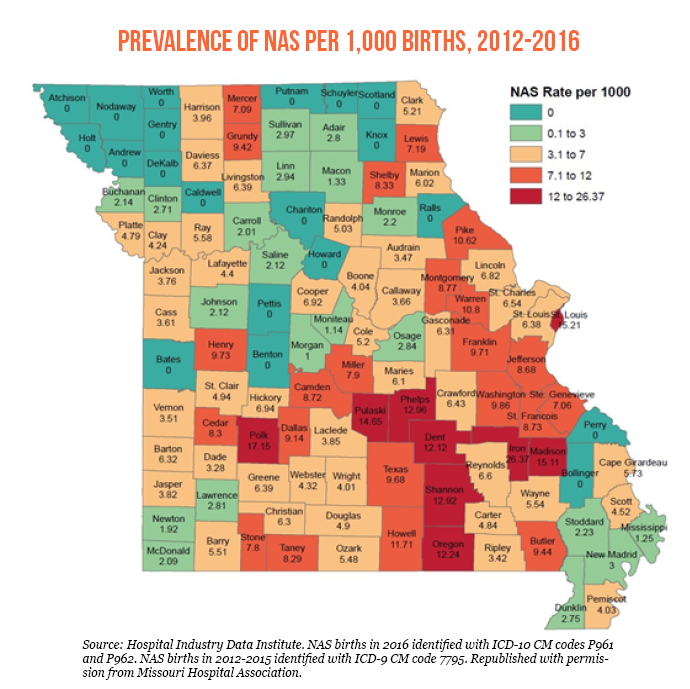Ensuring Healthy Moms and Babies
Pregnant women in Missouri are eligible for Medicaid or health coverage through the Show-Me Healthy Babies program if they earn less than 305% of federal poverty level ($62,281 for a family of three). Unless the new mothers have incomes below 23% of federal poverty level ($390 per month for a family of three), their Medicaid coverage ends 60 days after they give birth. This restriction limits their access to health and mental health services to address ongoing health issues that surfaced or intensified during or imm
ediately after their pregnancy. Extending the period for postpartum Medicaid coverage can help protect the health of new mothers and their children.
Depression and Anxiety During and After Pregnancy
Of particular concern is when new mothers develop symptoms of postpartum depression. According to the National Institute of Mental Health, these symptoms could include (listed in the link):
- Feeling sad, hopeless, empty, or overwhelmed
- Crying more often than usual or for no apparent reason
- Worrying or feeling overly anxious
- Feeling moody, irritable, or restless
- Oversleeping, or being unable to sleep even when her baby is asleep
- Having trouble concentrating, remembering details, and making decisions
- Experiencing anger or rage
- Losing interest in activities that are usually enjoyable
- Suffering from physical aches and pains, including frequent headaches, stomach problem, and muscle pain
- Eating too little or too much
- Withdrawing from or avoiding friends and family
- Having trouble bonding or forming an emotional attachment with her baby
- Persistently doubting her ability to care for her baby
- Thinking about harming herself or her baby
Drawing from an analysis by Penman and Winton, 2011 data from the Centers from Disease Control and Prevention indicate that Medicaid recipients are more than twice as likely (16.7%) to develop symptoms of perinatal anxiety and depression than non-Medicaid recipients (7.3%). This illustrates why Medicaid recipients often have a greater need for treatment. When left untreated, mothers may self-medicate with controlled substances, putting families at-risk.
Postpartum depressive symptoms can manifest in new moms up to one year after giving birth. Affording new mothers access to care and treatment services can help ensure the safety and health of children and families.
Addressing Opioid Addiction
Another concern is the extent to which pregnant women suffer from behavioral health issues during their pregnancy. The recent opioid crisis has impacted new mothers too. The proof is in the data. A recent analysis by the Missouri Hospital Association (MHA) noted a 538% increase in children born with Neonatal Abstinence Syndrome (NAS) over the last decade. According to the March of Dimes, NAS “happens when a baby is exposed to drugs in the womb before birth. A baby can then go through drug withdrawal after birth.” The organization’s webpage continues that it “most often is caused when a woman takes opioids during pregnancy.”
The following map, presented within the MHA analysis, shows the rate of Neonatal Abstinence Syndrome (NAS) per 1,000 births during years 2012 through 2016.

The maps shows rates of babies born with NAS were highest in Dent, Iron, Madison, Oregon, Phelps, Polk, Pulaski, Shannon, and the City of St. Louis.
With the current short window of Medicaid coverage provided to women after giving birth, they may have substance abuse treatment cut off prior to completion, which could inhibit the effectiveness of the treatment. Providing extended coverage to new mothers would allow them to pursue adequate treatment to address behavioral health issues such as opioid addiction and would reduce occurrences of withdrawal symptoms in babies in subsequent births.
Reducing Infant Mortality and Health Risks
Extending postpartum Medicaid coverage would allow women to access family planning services. According to research from the March of Dimes, these services can help ensure that there is adequate spacing between births, which helps to avoid “adverse birth outcomes, including preterm birth, neonatal morbidity, and low birthweight.” These outcomes can have lasting health effects for these children.
Healthy Moms, Healthy Families
Children have the greatest opportunity to be healthy when their parents are healthy. Extending postpartum Medicaid coverage will provide access to treatment and services that will lead to healthier outcomes for new mothers and their children.


